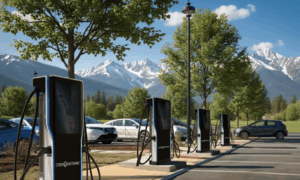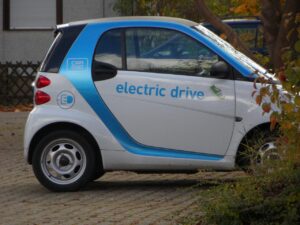The global push towards sustainability has brought electric vehicles (EVs) to the forefront of discussions on reducing greenhouse gas emissions and minimizing our carbon footprint. However, many wonder if converting traditional internal combustion engine (ICE) vehicles to electric power is a viable and sustainable solution. This article explores the environmental, economic, and technical aspects of converting vehicles to electric power and how it compares to purchasing new electric vehicles.
Environmental Impact: The Case for Conversion
The primary motivation for converting vehicles to electric power is to reduce emissions. Traditional gasoline and diesel vehicles are significant contributors to air pollution, emitting carbon dioxide (CO2), nitrogen oxides (NOx), and particulate matter. EVs, on the other hand, do not emit tailpipe pollutants, making them a cleaner option for reducing urban air pollution and global greenhouse gas emissions.
However, the environmental benefits of converting vehicles to electric power depend on several factors:
- Reducing Waste: Converting existing vehicles to electric power extends their lifecycle, reducing the need to manufacture new cars. The production of new vehicles, even electric ones, requires significant energy and raw materials such as steel, aluminum, and lithium for batteries. By converting vehicles, we can reduce the demand for these materials, thereby minimizing mining and manufacturing processes that have their own environmental impacts.
- Energy Source for Electricity: While EVs themselves produce no emissions, the electricity used to charge them often comes from fossil fuels. The sustainability of vehicle conversions largely depends on the energy mix in the region where the conversion takes place. In areas with a high reliance on renewable energy sources like wind, solar, or hydropower, the environmental benefits of conversion are more pronounced. However, if the electricity is generated primarily from coal or natural gas, the overall environmental impact may be less favorable.
- Battery Production and Disposal: One of the main concerns regarding EVs is the environmental impact of battery production and disposal. Lithium-ion batteries, commonly used in EVs, require mining of rare earth metals, which can lead to habitat destruction and pollution. Additionally, improper disposal of batteries can result in toxic waste. Sustainable practices, such as recycling batteries and developing new, less resource-intensive battery technologies, are critical to improving the overall sustainability of vehicle conversion.
Economic Considerations: Is Conversion Cost-Effective?
The financial aspect of converting a vehicle to electric power is another important factor to consider. Converting a vehicle to electric power involves replacing the internal combustion engine with an electric motor and installing a battery system. Depending on the complexity of the conversion, the costs can vary widely. For older or smaller vehicles, the conversion process can cost anywhere from $6,000 to $20,000 or more, depending on labor, parts, and battery size.
While the upfront costs of conversion may seem high, there are several long-term economic benefits:
- Lower Operating Costs: Electric vehicles are generally cheaper to operate than gasoline-powered vehicles. Electricity costs are typically lower than gasoline prices, and EVs require less maintenance since they have fewer moving parts. Over time, the savings from reduced fuel and maintenance costs can offset the initial investment in conversion.
- Incentives and Rebates: Some governments offer incentives and rebates for EV conversions. In many countries, there are tax credits or grants available for individuals who convert their vehicles to electric power. These financial incentives can make the process more affordable and accessible.
- Resale Value: As the market for electric vehicles grows, so does the demand for converted electric cars. Vehicles that have been properly converted to electric power can retain or even increase their resale value, especially as gasoline-powered vehicles become less desirable due to stricter emissions regulations.
Technical Challenges of Vehicle Conversion
While converting vehicles to electric power offers potential environmental and economic benefits, there are several technical challenges that must be addressed:
- Compatibility: Not all vehicles are suitable for conversion. Older vehicles with simpler mechanical systems are often easier to convert, while newer cars with more complex electronics may require specialized expertise. Additionally, converting larger vehicles, such as trucks or SUVs, may require more powerful and expensive batteries to achieve sufficient range and performance.
- Battery Range and Charging Infrastructure: One of the main concerns with electric vehicles is the range they can travel on a single charge. The range of a converted vehicle depends on the size and quality of the battery installed. For some, range anxiety—fear of running out of power before reaching a charging station—may be a deterrent to converting their vehicles. Furthermore, access to reliable charging infrastructure is crucial to the success of EV adoption, whether through new vehicles or conversions.
- Weight and Space Constraints: Electric batteries are heavy and take up considerable space, which can be a challenge in smaller vehicles. Converters must carefully consider how the added weight of the battery will affect the vehicle’s handling and overall safety. Additionally, finding enough space in the vehicle for the battery pack without compromising passenger or cargo space can be difficult.
- Regulatory Compliance: Converting a vehicle to electric power may require modifications to meet safety and emissions regulations in certain regions. It’s important to ensure that the converted vehicle complies with local laws and passes any necessary inspections.
Is Conversion the Most Sustainable Option?
While converting vehicles to electric power presents a sustainable alternative to purchasing new electric vehicles, it is not the perfect solution for everyone. Conversion offers significant environmental benefits, especially when it comes to reducing waste and prolonging the life of existing vehicles. However, the environmental impact is closely tied to the energy source for charging and the sustainability of battery production and disposal.
From an economic perspective, conversion can be a cost-effective option in the long run, especially with government incentives and lower operating costs. However, the initial investment and technical challenges may be prohibitive for some.
In comparison, purchasing new electric vehicles is often more convenient, offering better range, performance, and safety features. New EVs are also likely to benefit from advancements in battery technology and energy efficiency.
Conclusion
Converting vehicles to electric power can be a more sustainable option, especially for those looking to reduce waste and emissions without purchasing a new car. However, the decision to convert should be carefully considered based on environmental impact, economic feasibility, and technical challenges. For many, vehicle conversion offers an eco-friendly solution, but it must be weighed against other options such as purchasing new electric vehicles or adopting alternative forms of sustainable transportation. Ultimately, a combination of approaches will be necessary to achieve the global shift towards a more sustainable future in transportation.




